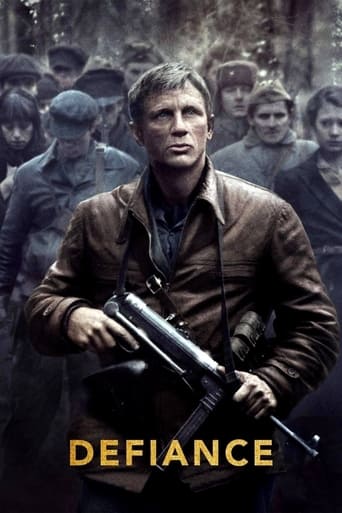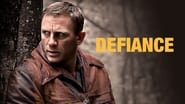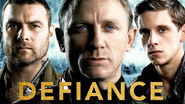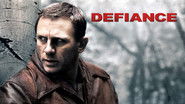Leonard Kniffel
There is no limit to my interest in films about World War II, so I am not sure how an interesting movie like Defiance did not catch my attention until eight years after it was made. The film succeeds on many levels in its effort to dispel the notion that all the murdered Jews of Europe went to their deaths without a fight. By dramatizing the true story of the four Bielski brothers and the formation of their community of partisans, Defiance pays tribute at last to this successful effort that saved 1,236 men, women, and children from the Nazi death camps and sent a significant number of their persecutors to their own deaths. For me, the problem with this movie is its handling of history, namely the complete omission of Poland from the narrative. You can almost hear director Edward Zwick trying to untangle the complicated net of ethnic, linguistic, religious, and political loyalties that ripped Poland to shreds as Germany and Russia plotted to divide the nation and exterminate any people who did not fit into their plan for world domination. Zwick's solution? Leave Poland out of the film entirely. The problem with this simplified rendition of history is that it is simply wrong. The Bielski family were Polish Jews. The community the real brothers built in the forests was in the vicinity of Nowogródek in a portion of German-occupied Poland that was annexed by the Soviet Union and made part of Belarus after the war.Of course, this is not a documentary film, any more than Shakespeare's history plays are documentaries. Defiance is based on a true story, but it is a fictionalized account, featuring outstanding performances by Daniel Craig and Liev Schreiber. Not a word of Polish is spoken by anyone in the film, which features dialogue in English, Russian, and German.For historical accounts, better to read two recent English-language books about the Bielski partisans: Defiance (1993) by Nechama Tec and The Bielski Brothers (2004) by Peter Duffy. A book (2009) in Polish by two reporters from Gazeta Wyborcza, Odwet: Prawdziwa historia braci Bielskich (Revenge: The True Story of the Bielski Brothers) focuses on the political and historical context in which the partisans operated, specifically the fighting between Polish and Soviet resistance groups in the Kresy (former Eastern Poland) region.
Ole Sandbaek Joergensen
This is a beautiful movie in many ways, also a very violent and sad one.The story in itself is a good one, it has it all, friendship, love (both brotherly and family), fighting, war and a lot more.The sceneries are very good, there are scenes in the forest that are really special and beautiful but only in the quiet moments. The war scenes are very rough and dirty as they should be.The cast is very good in this movie and to see a good danish actor in it was, well actually a surprise, I didn't know Iben Hjejle was in this one. I'm not a big history fan, but movies that are good, based on true events always make me want to find out more and read up-on-it :)
eric262003
Based on factual events, "Defiance" tells the story of three Jewish brothers from Poland, who succeeded in usurping the Nazis as they hideout from them in the deep forests along with other Jewish refugees as they settle into the Belarusian forests along with other Jewish recruits as they hide and prepare to defend themselves against the Nazis or any other anti-Semite groups wanting to have them terminated. Better known as the Bielski Partisans was defined as the most largest and successful Jewish factions who stood up against Nazi rulings and held their own in succession. It was quite peculiar though that when the filmmakers led by director Edward Zwick arrived on the scenes, they were surprised to discover that the local residents currently living have forgotten about such a tale and even more baffling was that there were were no Jewish people living there. Zwick leads his audience to explore how they survived, how they organized themselves, how their ethics were questioned and how their anecdotes can be narrated by melodrama. I will have to say that "Defiance" has all the essential tools to fit the criteria of a deeply emotional WWII Holocaust story. However, I felt a bit disconnected with the story mainly because the emphasis was more focused on the characters within the group as opposed how they're going to take down the Nazis. The Nazis were the prominent threat to the Jewish refugees like in the 2004 film "The Village". Do the Nazis have to be the primary narrative for this film to work? Not necessarily, but the film gets bogged down when personal conflicts, issues and romantic interludes that at times feels more like a reality show, that just lacks the vital substance that the far superior "Schindler's List" had to offer. It just feels more like a WWII survival story with some sporadic moments of Nazi in pursuit of finding these resistors and destroying the foundations they created. The action outside the surface of the trailers are also very meagre. The survival story here can depict any kind of period of time. In our darkest hours into our future, we may have to hideout in forests to survive. It would be grand if we had someone like the Bielski brothers there to help us if needed. They were farmers who were lethal, resourceful and adept at fighting skills and just great people to lead through difficult situations. The Bielski brothers are oldest one Tuvia (Daniel Craig), the middle one Zus (Liev Schreiber) and the second-youngest one Asael (Jamie Bell) and the youngest one Aron (George McKay). After escaping possible genocide from the Nazis, the brothers retreat into the forest. They're followed by other Jewish people in the surrounding area hiding out and resisting execution as well while the news of their hideout causes an outrage as the Nazis come looking for them. Tuvia the true leader here declares that all Jewish people must hide, even those not fit for fighting. Zus, the enforcer would rather kill Nazis than save the Jewish. The contrasting concepts between both brothers rings true today in Gaza between helping our kind while hurting theirs. The refugee ensemble play pivotal roles in means to survive out here in the wilderness. They learn to feed their families by robbing food, establishing a health clinic for the sick, building a court and even a tanning salon of all things. Sure romance becomes commonplace everywhere, but in a movie that has tension building up to your ears, it really doesn't have a place here in this movie and some are just so implausibly too warm for a film of this magnitude. Craig and Schreiber play their respected roles convincingly and their contrary ways of war versus peace almost gets pretty personal until Zus gives up hope and joins up with the Russian partisans who hate the Jewish just as much as the Nazis. The most interesting character outside the Bielski brothers is an incompetent middle-aged man named Shimon Haretz (Allen Corduner) wants in on the group as they ask what he is known for. Appearing to be in intellect, but his skills have so significance to the partisans, but he's still welcomed to stay. At the time the refugees were predominately cultivators and peasants, while others were handy craftsmen, artists and labourers. If I was in their position what good would I be to them? In many ways there are more Shimon Hartetz's than actual warriors settling there. The best an possibly the most nuanced performance comes from Liev Schreiber. That's because Zus Bielski has his sights set on the real reason they're hiding in the first place. To kill as many Nazis before they strike at them. Daniel Craig is still good Tuvia, as the more peaceful leader, but he's more occupied in being like a mayor and organizing laws and community planning which is necessary, but not logical. So as a Nazi looks by, he notices that the Bielskis had turned their refugee camp into a booming village in the wilderness. As time goes on, it becomes more dire as Nazis and other Anti-Semites were coming from Germany, Russia and Poland. The obey by Soviet forces but can't be hoodwinked. Their efforts succeeded and to this many Jewish people would have never been born had it not been for the Bielski brothers.
zardoz-13
What director Edward Zwick did for African-Americans during the American Civil in his movie "Glory," he does for Jewish refugees in his World War II combat epic "Defiance." Daniel Craig, Liev Schreiber, and Jamie Bell play three heroic Jewish brothers who fled from Nazi-held Poland into the Belarussian forest, marched hundreds of Jews into the wilderness, built a camp, and hid them from Hitler's murderous troops. Naturally, the Brothers Bielski clashed among themselves, and Zus (Live Schreiber) went off and fought with the Soviets, while Tuvia acted like Moses and provided food, water, and camaraderie for these exiled Jews. Unfortunately, no matter how stirring the combat scenes are, "Defiance" is a conventional World War II movie that benefits immeasurably from a true story. Zwick and "Under Fire" scenarist Clayton Frohman adapted Nechama Tec's non-fictional account "Defiance: The Bielski Partisans." After Zus joins the Soviets, he discovers the latent anti-Semitism within the ranks. Meantime, Tuvia learns about the price of leadership. He has to orchestrate the large population that he conceals in the wood and feed them. Tuvia orders that the women be trained to handle firearms. He dispatches food patrols and monitors the Nazis, but disputes break out when the fighters who found the food insist on having greater shares. The problem with "Defiance" is that Zwick relies on clichés galore when this compelling narrative could have sacrificed most of the clichés. The logistics of trooping around these Jewish refugees are colossal. At one point, a Jewish man tells them that they cannot do the impossible, and Asael Bielski reminds them that they have already done the impossible. The combat scenes are staged vividly by Zwick and lenser Eduardo Serra. World War II fanatics will enjoy this above-average yarn.







